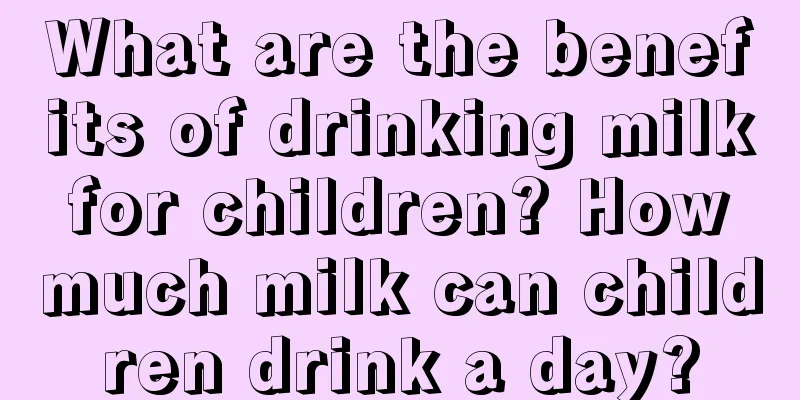What are the benefits of drinking milk for children? How much milk can children drink a day?

|
Everyone should have drunk milk in their lives, but do you know what are the benefits of drinking milk for children? Today, let's learn about it together. What are the benefits of drinking milk for children? And how much milk can children drink a day? Let's learn together with the editor. What are the benefits of drinking milk for children?The childhood stage is a very important period for physical and intellectual development, so a lot of nutrition is needed to meet the needs of development. At this time, you should eat more nutritious foods. Milk contains many nutrients, and the effect of calcium supplementation is very good. The calcium content in milk is very high and is easily absorbed by the human body. Calcium is an element that is absolutely indispensable for children's bone development. If there is a lack of calcium, it will cause children's bone maldevelopment, which will affect height, and will also affect bone density, leading to osteoporosis. If you want to increase bone density, you must start from an early age, especially during the period of rapid development of children. Therefore, children cannot lack calcium, and milk is the best food that can strengthen bones and supplement calcium. Moreover, after the immunoglobulin in milk enters the intestines, it will also play a role in enhancing the body's immunity. How much milk can children drink in a day?In fact, although milk is rich in nutrients, drinking too much can do more harm than good. Infants and young children should take in about 400-600 mg of calcium per day, and adolescents can take in 800 mg of calcium per day. A cup of milk generally contains 100 mg of calcium, so drinking 400-500 ml of milk a day is enough. We can also get calcium from other foods. If the amount of calcium intake greatly exceeds the above standard, it will interfere with the absorption and utilization of other trace elements such as zinc, iron, and magnesium, and may also cause calcium deposition in organs and tissues such as the kidneys and cardiovascular system, such as the potential risk of kidney stones. We know that children's growth does not only rely on calcium, but also requires the cooperation of other nutrients. Simply focusing on calcium supplementation will be detrimental to growth. What are the dangers of drinking too much milk every day for children?1. Drinking too much milk increases the burden on the kidneys The main component of dairy products is protein. The protein content of ordinary fresh milk is about 3%, while infant formula may contain a higher protein content. If you think that the higher the protein content, the better the nutrition, you are wrong. Just like you can only eat 2 eggs a day at most, you can't drink too much milk, otherwise it will cause gastrointestinal indigestion, and more importantly, it will cause kidney burden. 2. Drinking too much milk may cause premature puberty Many studies in the United States have shown that drinking too much milk is an important cause of precocious puberty in children. This is because cattle farms feed cows feed containing growth hormones in order to increase milk production. Although there are currently stricter standards for milk production, drinking too much milk still poses certain risks. 3. Drinking too much milk will make you fat The fat content in milk is close to that of protein, also around 3%. Drinking too much milk can easily lead to excessive energy intake, thus causing obesity. The saturated fatty acids in milk are not good for cardiovascular health. In addition, milk also contains a lot of sugar, which can also cause obesity. What should children pay attention to when drinking milk?1. Pay attention to the timing when your baby drinks milk Generally speaking, it is best not to drink milk for babies under 1 year old. At this time, the large amount of nutrients in milk are not easily digested and absorbed by the baby's delicate intestines, which is not conducive to growth and development. In addition, milk may also be a trigger for milk protein allergy. When the baby is 2 years old, you can give him milk and dairy products regularly, about 300 to 350 grams a day. 2. Drinking milk on an empty stomach will result in low absorption efficiency of nutrients When the stomach is empty, milk stays in the stomach for a short time, and the nutrients are often not absorbed by the body in time. In addition, drinking milk on an empty stomach will also increase the chance of lactose intolerance. 3. Milk is a good staple food, but not in excess Many parents are used to storing large barrels of milk in the refrigerator, and even let their children drink milk as water. In fact, babies who mainly eat milk should not drink more than 1 kg of milk a day. If the amount exceeds 1 kg, there will be hidden bleeding in the stool, and anemia is likely to occur over time. |
Recommend
The best time and techniques for conception What are the symptoms of conception
Preparing for pregnancy is a difficult process, e...
What effect does eating blueberries have on the fetus when pregnant? What should you pay attention to when eating blueberries during breastfeeding?
Many people like to eat blueberries, which are ri...
What is scabies in children and how to treat it
Children have poor physical fitness and are easil...
Dolormin antipyretic juice instructions Dolormin antipyretic juice usage and dosage
NUROFEN Antipyretic Juice is an antipyretic medic...
How to train your baby to defecate on time? What to do if your child is constipated for a long time
Sometimes babies don't eat well, which leads ...
Is the Thai TwinLotus Chinese Herbal Toothpaste good to use? Review
Toothpaste is a necessity in our daily life. We a...
How should babies dress in autumn? What should babies wear in autumn?
How to dress babies in autumn? Compared with the ...
Is baby rice cereal cooked or raw? Is baby rice cereal made with boiling water or warm water?
Baby rice cereal is a product that we are all ver...
Where is the injection for oxytocin? Will it hurt?
Generally, when the pregnancy is full, the fetus ...
Recommended baby boy names with nice nicknames and elegant and calm meanings
Every parent is very concerned about the meaning ...
How old should you wear diapers? How old should you wear diapers?
Diapers are a must-have product for babies. Today...
What is the educational significance of Home with Kids? Home with Kids Growing Up
With Yang Zi's popularity, the well-known TV ...
Can 75% alcohol wipes be used to wipe baby's hands? Can 75% alcohol wipes be used to wipe tableware?
The most common alcohol wipes are 75% alcohol wip...
Why is it that one eye is bigger than the other? Be alert to these four possibilities
Eyes are the most important organ in the human bo...
Does my milk supply decrease when my period comes? What should I do if my milk supply is low during my period?
Many mothers have this trouble, that is, the baby...









